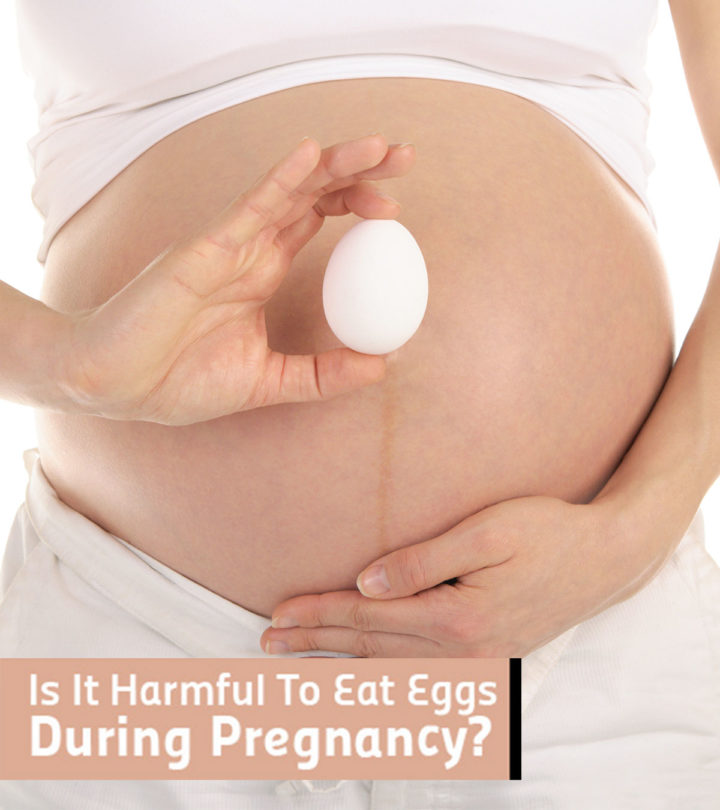Is It Bad to Eat Eggs Everyday While Pregnant

Image: Shutterstock
- Is it safe to eat eggs while pregnant?
- What are the benefits of eating eggs during pregnancy?
- How many eggs can a pregnant woman eat in a day?
- How to select the best eggs during pregnancy?
- What is the correct way to store eggs?
- How to include eggs in a pregnancy diet?
- What is the shelf life of eggs?
- Risks of eating eggs during pregnancy
- Precautions to avoid bacterial infections with egg consumption
Eggs are among the few things that most people consider when it comes to healthy eating, for they contain all the essential nutrients including proteins, fats, and minerals. A healthy pregnancy diet should also include eggs to benefit from the nutrition they offer. That said, how safe are eggs during pregnancy and how much of this poultry product should you consume?
Find out more about eating eggs during pregnancy, the risks they pose and ways to include them in the diet.
Is It Safe To Eat Eggs While Pregnant?
Yes, it is safe to eat eggs during pregnancy, provided they are completely cooked or pasteurized. Raw or undercooked eggs contain harmful bacteria such as salmonella that is likely to cause food poisoning. Cooking and pasteurizing the eggs will kill the bacteria, and it will reduce the risk of salmonella poisoning (1).
Back to top
What Are The Benefits Of Eating Eggs During Pregnancy?
Eggs are nutrient-rich foods good for both the mother and the developing baby. The benefits of including them in your diet are mentioned next:
- Rich protein sources: Protein is essential for the healthy development of the baby as every fetal cell is made of protein. Eating eggs in sufficient quantity can be helpful for the growing fetus (2).Eggs are a complete source of protein, since they contain all nine essential amino acids, which the body cannot synthesize.
- Rich sources of vitamins B 2, B 6, B12, vitamin D, and minerals such as selenium,zinc,iron and copper.
- Fetal brain development: Eggs contain good levels of choline that is good for the growth and development of the fetal brain. It will, therefore, protect the baby from neural tube defects (3) (4).
- Provides calories: You will require about 200 to 300 extra calories in a day during pregnancy (5). An average-sized egg gives around 70 calories, thus helping meet the calorie requirement of both the mother and the baby (6).
- Regulates cholesterol: Eating eggs regularly will balance the cholesterol levels in the body (7). You should talk to your doctor about your diet if you have cholesterol issue.
Back to top
How Many Eggs Can A Pregnant Woman Eat In A Day?
The daily intake of eggs depends on the cholesterol levels in your body. It is advisable to include three to four eggs a week if your cholesterol levels are normal.
Back to top
How To Select The Best Eggs During Pregnancy?
Though some foods are loaded with high nutrition, they might be harmful if not correctly chosen. Remember the below points while picking eggs from a store:
- Do not forget to check the best-before or sell-by date for packaged eggs.
- Do not buy eggs that have cracked shells as they are susceptible to bacteria and dirt.
- Prefer buying organic eggs as they do not use any antibiotics or hormones in the poultry (8).
- Do a freshness test: Put the eggs in a bowl of water. If they float, they are not fresh, and if they sink to the bottom, they are considered fresh. Another way is to shake the egg near your ear. If it makes a splattering sound, it is not fresh. And if it doesn't, it is a fresh egg (9).
- Do not use an egg right out of the refrigerator. Let it set in the room temperature for at least two hours. This is to prevent bacterial contamination of the egg that undergoes perspiration when it is moved to a warmer space from a colder space.
Back to top
What Is The Correct Way To Store Eggs?
To avoid bacterial contamination, store the eggs in the following manner (10):
- Keep them in egg trays inside the refrigerator to lower the chance of spoilage.
- Keep them in a separate tray, away from other food items.
- Store in the central area of the refrigerator, where the temperature is consistent, rather than on the side of the door.
- Do not store hard-boiled eggs in the fridge for more than three days.
Back to top
How To Include Eggs In A Pregnancy Diet?
Here is how you can cook or prepare eggs to include in your pregnancy diet (11):
- Boil an egg for at least five to seven minutes so that it is properly cooked.
- If you prefer frying eggs, fry them such that the white becomes solid and is no longer translucent.
- You can add new flavors and texture by using spices and vegetables rather than eating them plain.
Back to top
What Is The Shelf Life Of Eggs?
- An egg should be ideally consumed within 28 days from the time it is laid.
- Consume boiled eggs within two to three days
- Foods containing eggs in any form need to be consumed immediately.
Back to top
Risks Of Eating Eggs During Pregnancy
Consuming eggs might be risky if you do not choose or cook them correctly.
- Raw or undercooked eggs contain Salmonella bacteria that cause food poisoning (1). It can lead to serious effects including high fever, vomiting, diarrhea, dehydration, and abdominal pain. Sometimes, it might also lead to miscarriage or preterm labor.
- Some women are likely to develop allergic reactions such as skin rash, hives, and nasal congestion.
- Egg yolk could cause dangerous cholesterol build-up if you are already suffering from cholesterol issues.
Back to top
Precautions To Avoid Bacterial Infections With Egg Consumption
- Eggs should be cooked to 160°F (1)
- Handle eggs with thoroughly washed hands
- Use clean utensils that are cleaned with hot water
- Do not splatter raw egg over other food items
- Do not place eggs near other foods
- Clean the platform and utensils with hot water after cooking eggs
- Do not eat items such as mayonnaise or mousse that contain raw egg (11)
- Do not consider eating eggs outside if you are not sure of the quality or its conditions of preparation.
- Avoid consuming if you get any unusual smell or if the egg is runny (12).
Back to top
Although there are certain health risks associated with egg consumption during pregnancy, you can include them as long as you follow the above precautionary measures. But remember, it is a great addition to your healthy diet unless you are allergic to it.
Do you have anything more to share about consuming eggs during pregnancy? Tell us in the below comment section.
References:
MomJunction's articles are written after analyzing the research works of expert authors and institutions. Our references consist of resources established by authorities in their respective fields. You can learn more about the authenticity of the information we present in our editorial policy.
The following two tabs change content below.
- Reviewer
- Author

Burcu Saygan Karamürsel is a board certified obstetrics - gynecology and maternal-fetal medicine specialist working in Ankara,Turkey. A graduate from Hacettepe University Medical School, she has also attended a fellowship programme at Bonn University Hospital, Perinatology Department. Currently, she runs her own private clinic in Ankara and contributes to several newspapers' online health columns and websites. She is specialized in... more

Rebecca is a pregnancy writer and editor with a passion for delivering research-based and engaging content in areas of fertility, pregnancy, birth, and post-pregnancy. She has been into health and wellness writing since 2010. She received her graduate degree in Biotechnology and Genetics from Loyola Academy, Osmania University and obtained a certification in 'Nutrition and Lifestyle in Pregnancy' from Ludwig... more
Is It Bad to Eat Eggs Everyday While Pregnant
Source: https://www.momjunction.com/articles/harmful-to-eat-eggs-during-pregnancy_00187/